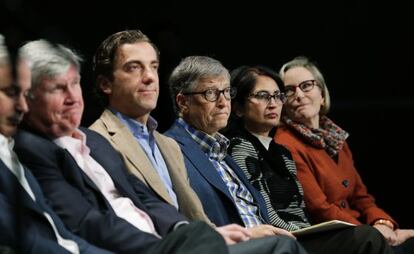Where are Spain’s multi-millionaire philanthropists?
The country’s super-rich are far from matching the generosity of Zuckerberg and Gates


Will Mark Zuckerberg’s announcement that he will donate 99 percent of his Facebook shares – worth around €42 billion – to philanthropic projects inspire other super-wealthy people to be more generous? Zuckerberg said last week that he hoped so. But Spain has yet to see a Warren Buffet, Bill Gates or Zuckerberg step forward.
Take Amancio Ortega, founder of the Zara empire and the second-richest man on the planet. His fortune exceeds Zuckerberg’s by around €15 billion, but his generosity doesn’t come close to that of the social networks king. “There is no culture of philanthropy in this country,” says Catalina Parra of Philanthropic Intelligence, which advises the wealthy on how best to do good with their money. “There are a few people trying to bring about change, but I’d like it if our philanthropy were more advanced and thought out,” she says, adding that many Spanish millionaires hold back because they want to be sure their money is being spent properly, and throw in the towel, fearful that it won’t be.
Ortega wants to make his home region a better place; Zuckerberg and Gates want to change the world
Zuckerberg’s ambitions go way beyond Ortega’s timid donations, which have totaled more than €150 million over the course of his career and have mostly been focused on Spain, particularly his native Galicia. While the Facebook founder is a member of a group of 28 multi-millionaires called Breakthrough Energy Coalition, an alliance against climate change that has promised to invest billions of euros in clean-energy projects, Ortega has given money toward a cancer unit and to build junior schools in Galicia. Ortega wants to make his home region a better place; Zuckerberg, Bill Gates, Amazon’s Jeff Bezos, and Jack Ma of Alibaba want to change the world.
Ortega has set up a foundation in his name that last year gave €20 million to Catholic charity Cáritas, along with €4 million to food banks. This year he has donated more than €6 million to a Catholic Church-funded organization that helps the homeless and elderly in A Coruña. He has also funded study grants in the United States and Canada. It is estimated that his contributions to social projects will help around 43,000 people this year, plus a further 3,675 children through his donations to building schools.
Other wealthy Spaniards who have sought to do good with their fortunes are Ortega’s late wife, Rosalía Mera, who created a foundation that has invested in social, entrepreneurial and educational projects and that is now run by her daughter Sandra.
Then there is construction magnate Rafael del Pino, and Juan Roig, the founder of supermarket chain Mercadona, who has set up a €25 million fund to help create small businesses. The Botín family, which owns the Santander banking group, has a foundation that last year invested €34.4 million in educational and scientific projects around the world. The Muga family, which owns the winery of the same name, also invests in social projects.
But these contributions do not come close to the amounts given by some of the United States’ wealthiest. Borja Durán, the CEO of Wealth Solutions, which advises the rich on how to manage their money, says he is surprised at the differences between the American and the Latin and European worlds.
“I studied in the United States and have that culture in my DNA,” he says. “Many university buildings there have been financed through donations. The Chicago Business School changed its name when David G. Booth donated €300 million and is now called the University of Chicago Booth School of Business. There is more awareness, and the tax laws also help. They have been steeped in that culture since childhood and they have a real desire to give part of what they have received back to society there, much more so than in Europe. But don’t forget that the rich pay less tax in the United States and they decide how they want to spend their money, rather than the state deciding,” he notes.
In the US they have a real desire to give part of what they have received back to society” Borja Durán, CEO of Wealth Solutions
Durán’s consultancy aims to help Spain’s super-rich feel more confident about donating: “We have realized that there are many people with money to donate but who don’t. First, because they don’t have time, they don’t know how, or they simply don’t trust anybody. There have been scandals. and people simply don’t know how to go about donating money. In the second place, these people want to know where every single euro is going to be spent.”
Both Parra and Durán say the sector is becoming more professional in Spain, and that the wealthy are starting to hire experts to help them put their money to good use. They highlight so-called impact philanthropy, which aims to fund projects that are soon self-sustaining. “In the end, you can’t take your money with you,” says Durán. “That is why Gates and Zuckerberg want to leave something behind.”
Tu suscripción se está usando en otro dispositivo
¿Quieres añadir otro usuario a tu suscripción?
Si continúas leyendo en este dispositivo, no se podrá leer en el otro.
FlechaTu suscripción se está usando en otro dispositivo y solo puedes acceder a EL PAÍS desde un dispositivo a la vez.
Si quieres compartir tu cuenta, cambia tu suscripción a la modalidad Premium, así podrás añadir otro usuario. Cada uno accederá con su propia cuenta de email, lo que os permitirá personalizar vuestra experiencia en EL PAÍS.
¿Tienes una suscripción de empresa? Accede aquí para contratar más cuentas.
En el caso de no saber quién está usando tu cuenta, te recomendamos cambiar tu contraseña aquí.
Si decides continuar compartiendo tu cuenta, este mensaje se mostrará en tu dispositivo y en el de la otra persona que está usando tu cuenta de forma indefinida, afectando a tu experiencia de lectura. Puedes consultar aquí los términos y condiciones de la suscripción digital.








































